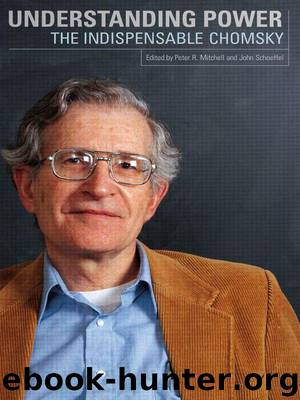Understanding Power: the indispensable Chomsky by Chomsky Noam & Schoeffel John & Mitchell Peter R

Author:Chomsky, Noam & Schoeffel, John & Mitchell, Peter R. [Mitchell, Peter R.]
Language: eng
Format: epub, mobi
Tags: Noam - Political and social views., Noam - Interviews., Chomsky
Publisher: Scribe Publications
Published: 2002-05-31T14:00:00+00:00
“Want” Creation
MAN: But you could say that “to truck and barter” is human nature—that people are fundamentally materialist, and will always want to accumulate more and more under any social structure.
You could say it, but there’s no reason to believe it. You look at peasant societies, they go on for thousands of years without it—do those people have a different human nature? Or just look inside a family: do people “truck and barter” over how much you’re going to eat for dinner? Well, certainly a family is a normal social structure, and you don’t see people accumulating more and more for themselves regardless of the needs of the other people.
In fact, just take a look at the history of “trucking and bartering” itself: look at the history of modern capitalism, about which we know a lot. The first thing you’ll notice is, peasants had to be driven by force and violence into a wage-labor system they did not want; then major efforts were undertaken —conscious efforts—to create wants. In fact, if you look back, there’s a whole interesting literature of conscious discussion of the need to manufacture wants in the general population. It’s happened over the whole long stretch of capitalism of course, but one place where you can see it very nicely encapsulated is around the time when slavery was terminated. It’s very dramatic to look at cases like these.
For example, in 1831 there was a big slave revolt in Jamaica—which was one of the things that led the British to decide to give up slavery in their colonies: after some slave revolts, they basically said, “It’s not paying anymore.” So within a couple years the British wanted to move from a slave economy to a so-called “free” economy, but they still wanted the basic structure to remain exactly the same—and if you take a look back at the parliamentary debates in England at the time, they were talking very consciously about all this. They were saying: look, we’ve got to keep it the way it is, the masters have to become the owners, the slaves have to become the happy workers—somehow we’ve got to work it all out.
Well, there was a little problem in Jamaica: since there was a lot of open land there, when the British let the slaves go free they just wanted to move out onto the land and be perfectly happy, they didn’t want to work for the British sugar plantations anymore. So what everyone was asking in Parliament in London was, “How can we force them to keep working for us, even when they’re no longer enslaved into it?” Alright, two things were decided upon: first, they would use state force to close off the open land and prevent people from going and surviving on their own. And secondly, they realized that since all these workers didn’t really want a lot of things—they just wanted to satisfy their basic needs, which they could easily do in that tropical climate—the British capitalists would have
Download
Understanding Power: the indispensable Chomsky by Chomsky Noam & Schoeffel John & Mitchell Peter R.mobi
This site does not store any files on its server. We only index and link to content provided by other sites. Please contact the content providers to delete copyright contents if any and email us, we'll remove relevant links or contents immediately.
The Secret History by Donna Tartt(16627)
The Social Justice Warrior Handbook by Lisa De Pasquale(11489)
Thirteen Reasons Why by Jay Asher(7788)
This Is How You Lose Her by Junot Diaz(5774)
Weapons of Math Destruction by Cathy O'Neil(5038)
Zero to One by Peter Thiel(4824)
The Myth of the Strong Leader by Archie Brown(4789)
Promise Me, Dad by Joe Biden(4449)
Beartown by Fredrik Backman(4419)
Stone's Rules by Roger Stone(4416)
How Democracies Die by Steven Levitsky & Daniel Ziblatt(4399)
The Fire Next Time by James Baldwin(4343)
100 Deadly Skills by Clint Emerson(4079)
A Higher Loyalty: Truth, Lies, and Leadership by James Comey(4033)
Rise and Kill First by Ronen Bergman(4012)
The David Icke Guide to the Global Conspiracy (and how to end it) by David Icke(3883)
The Farm by Tom Rob Smith(3872)
Secrecy World by Jake Bernstein(3783)
The Doomsday Machine by Daniel Ellsberg(3731)
